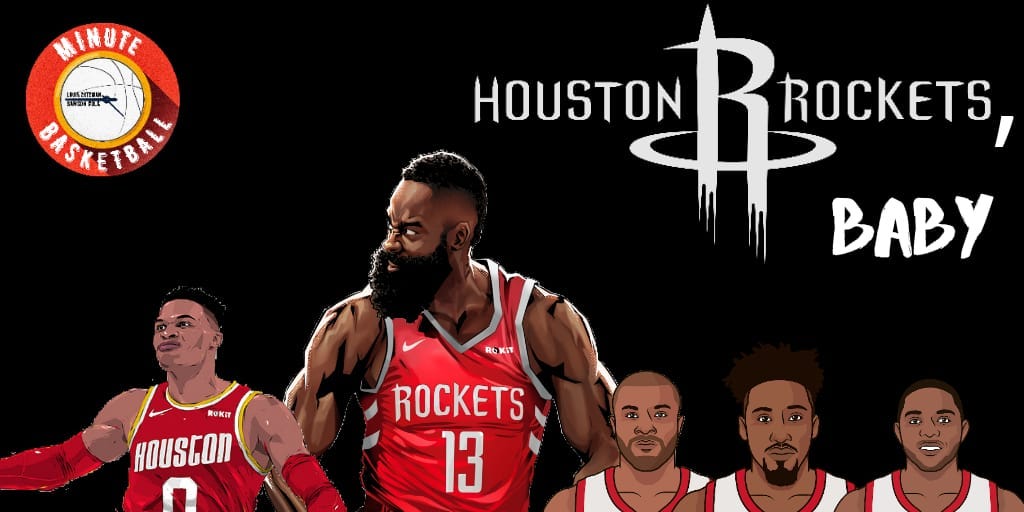
Innovation often breeds contempt.
For Galileo Galilei’s claim that the Earth revolved around the sun (correctly, as it turned out), the Catholic Church wanted to burn him at the stake. instead he was imprisoned indefinitely. For just generally being annoying and asking lots of questions, Socrates was forced to drink hemlock, which was his death. Partly for his belief in natural virtue, and partly because Roman emperor Nero was a crazy person, politician and philosopher Seneca the Younger was forced to take his own life.
Now, Galileo, Socrates, and Seneca the Younger are all philosophers, but so too are James Harden, Daryl Morey, and Mike D’Antoni. They are innovating the game of basketball before our very eyes. And, like the Greek and Italian philosophers of antiquity, so too are the Houston Rockets despised for their labours.
Part of the derision is because the Rockets are innovating away from aesthetics. Free throws are not fun to watch. Contested triples are not fun to watch. Uncontested layups are not fun to watch. Houston leverages the threat of each category to create points in the others, like a twisted bank robber who alternately uses rocks and papers and scissors to manipulate his way into the vault.
Houston uses very little ball or player movement. There is no concern with imagery inherent to Houston’s approach. There is no consideration with popularity. Similarly, the Rockets don’t care a whit about how playstyle might affect player morale; most teams want bit players involved, touching the ball here and there, so as to keep defensive effort engaged. The Rockets ask their players to do nothing on offense: stand still, shoot if you’re open, and you still better try as hard as you can on defense. By and large, Houston has collected players who do that.
The Rockets want to play ugly. They want to play slow, static basketball, because they will create better shots than their opponents in such inhospitable environments.
Houston may be hated, but the Rockets still win. They are a cold, calculating machine. Gary Kasparov may have beaten Deep Blue three times in 1996, perhaps the first time man faced machine, at least in the chess world, but now computers annihilate human opponents, toy with them, eat them from the inside out. Magnus Carlsen, Bobby Fischer, Paul Morphy: all at their peaks would be reduced to sweating misery in a full, televised match against the synthetic brilliance of AlphaZero.
The Rockets play the Berlin opening, a famous system designed for passivity and defensiveness. Houston defangs its opponents by trading the queens early in the opening. Play slow, switch everything, who can create the best shots now? Yet through Harden, the Rox retain their tactical brilliance. Harden can dig inside the Berlin with the sharpness of the Scotch, and as a result Houston is almost unbeatable at their own game.
(Also, as with the Rockets in basketball, the synthetics of chess computers is not popular to watch: no one but the most hardcore chess fanatics watches chess computers play one another, although in terms of FIDE rating the gap between AlphaZero and the highest rating a human has ever achieved is about the same as the gap between that human peak and me.)
And, like chess computers, so too do the Rockets terminate their all-too-human opponents. They innovate, they earn contempt and disinterest, and they win.
Looking defense - Zatzman
Math, chess, and dehydration
Have you ever tried working out the math that connects quantum mechanics with Newtonian physics? Probably not, that’s an unfair question, and I haven’t done it either. In fact, no one can. The math unravels, falls apart like a sand castle in the tide. They can’t be related, at least not yet. Quantum mechanics, like basketball, is defined by leaps, probability. Newtonian certainties like gravity make no sense. That’s how the Los Angeles Lakers must feel trying to match the Rockets, at times.
Houston’s best fivesome, Russell Westbrook, James Harden, Eric Gordon, Robert Covington, and PJ Tucker, features five players who are all, defensively, unstoppable forces and immovable objects. Try moving them. I dare you. Houston’s Rockets may not be tall, but they’re extremely, uhh, sturdy, and each player is stronger than the next. All five have strong hands, thick torsos, long arms, and they’re not afraid to rip the ball away at the slightest provocation. Their defensive innovation is to play five un-post-able players and demand that opponents beat you in the post.
But just try entering the ball there.

Houston’s defenders always front the post, and Tucker and Covington are un-seal-able, as energetic as water mills, ever-moving. Plus, their defensive positioning on the weak-side is always meant to take away post entries over the top as much as skip passes to the corner. Covington in particular is a turnover magnet, with hands like suction cups that find every loose ball. Thus far in the playoffs, Covington, Tucker, and Harden have steal rates above the 80th percentile, and Covington, Gordon, and Harden have block rates above the 80th percentile. The Rockets will create deflections in the chaos.
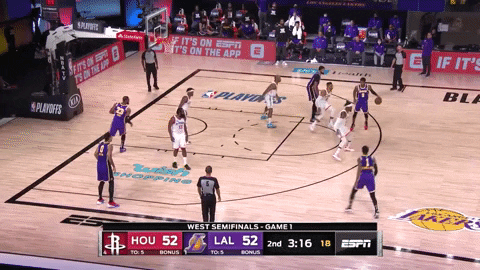
The Rockets are at their best switching everything one through five. Offenses can’t play quickly against switches without forcing turnovers, and turnovers are juicy lines of cocaine for Houston; drop the ball and watch how fast Houston revs its engines. They switch, jam the paint with thick, if short, bodies, grind the shot-clock away, and let teams run into the wall over and again. The Rockets stunt into the lane to close gaps and turn opposing offenses into the muds of Passchendaele.
Really, the Rockets don’t need cocaine to be hyperactive on defense. They’ve already got that part downpat.
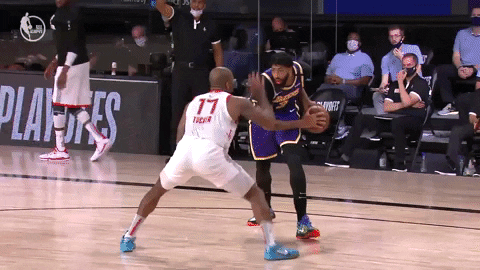
What can you create, Lakers? the Rockets asked in game one, and the Lakers answered with a Danny Green pull-up, or an Anthony Davis post-up, or a LeBron James step-back triple. If every offensive possession you run against Houston is trying to post up one of their stout defenders, they will grind your bones to make their bread. The Lakers even made one or even two of those looks, but it was not a self-sustaining offensive system. Los Angeles’ offensive choices in game one were between dying of thirst and choosing, being forced, to drink ocean water:
Points, points everywhere, but not a point to score.
That was the Rockets at their peak. At their nadir -- for example, the Rockets for the majority of games two and three -- Houston’s defense is less an ocean and more a kiddy pool. The Rockets don’t always maintain the peak effort required to close every gap. They let opponents drive, stunts only half-hearted. Swiping at the ball, instead of moving your feet, when you’re supposed to close off the drive and then hustle back to the shooter, is always a cardinal defense sin. But against LeBron James, it’s certain death.
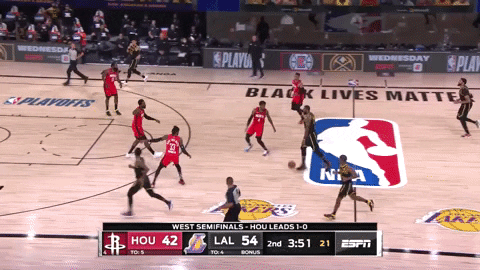
When the stunts are faked, James and even Rajon Rondo waltzed unchecked to the rim. It’s ironic that for all Houston’s innovation, the simple drive is Houston’s kryptonite. When feet touch the paint, and Houston has to sell out to stop the layup, the Rockets have no chance to recover. Covington is an excellent rim protector, but not when larger, stronger opponents see him coming. Tucker can protect the rim when opponents have to play through his chest, not when he has to sprint to meet James or Davis in the paint. For all his strength and girth and happy feet, he can’t bother those chiseled superstars in the air.
Even when Houston’s half-court defense was firing, the Lakers ran in transition and created shots that way. Then in game three, Rondo started hitting triples, and the Rockets drowned in their own sea of mathematics.
And so Houston’s defense is an all-or-nothing affair. They either dehydrate opponents or casually offer them water to drink. They play the Berlin, either positional stranglers or patzers, hanging pieces, forging ahead without cohesive planning.
The Rockets could beat the Lakers if they return the game to the simple repetition of Houston’s ideal; slow, grindy, post play from their opponents. If Houston’s games remind you of Groundhog Day, pick the Rox. They can do it again against the Lakers, but it requires the type of sustained focus that we haven’t yet seen from all of Houston’s defenders, beyond Tucker.
But even if the Rockets do advance, Kawhi Leonard should be the hemlock to Houston’s innovations. Leonard is a mudder, more capable of generating buckets in the grime than anyone not named Kevin Durant. Force him to play in the post, and he will thank you. The Berlin may be able to beat the Lakers if the Rockets keep their focus, but Leonard is the AlphaZero of the basketball world. The Rockets may be cold and calculating, but peak Leonard will always be colder.
Looking Offense - Folk
The Rockets have interested me so much because how they’re perceived and talked about seems, to my eye, to be continuously wrong. There’s this idea that they’re playing some hyper futuristic version of basketball. A soulless husk that creates corner threes, layups, and nothing else. However (comma) as in the simple complexity of a pawn endgame, the Rockets have stripped the game down to it’s very essence. Everything they’ve built is dependent on one thing: James Harden’s defender can’t really guard him 1-on-1.
Since Harden is a hulking, vibrant offensive system all to himself, teams double him. When that happens, he passes out, and the Rockets try to make things work in 4-on-3 situations. In this case, it’s against a rapidly stunting Lakers team that considers anything outside of a layup or a corner 3 a win.
For the most part, the Rockets are outfoxing the Lakers. It’s the end of games, where the Lakers eagerly help against Harden if he has the ball, furiously work to deny him the ball, and properly vex the rest of the Rockets (save for Covington, perhaps) when they have to make decisions. That’s where the imbalance has reared its ugly head for the Rockets. It might seem lazy to describe it as such, and it’s not everything that’s wrong, but Russell Westbrook isn’t really holding up his end of the superstar deal. When Westbrook is posting higher USG% than Harden over these games -- and astronomically higher in 4th quarters (42.9% vs. 28.6%) -- that’s typically where the Lakers are winning. And the thing is, Westbrook is operating in situations that are generally advantageous by proxy of how they’re created - an absurd amount of attention on Harden.
And don’t get me wrong, there’s an idealized version of this. Harden operates in the pick n’ roll like few other players in league history, leaving teams in the vicious circle of allowing him to march to the rim, drop in floaters, or throw lobs. The fact that him at a standstill above the break sends teams into a frenzy is all you need to know. His stepback 3 is as daunting a weapon as any in the league. He goes on month-long tears where he’s virtually unstoppable. When teams adjust, former MVP Russell Westbrook is supposed to eviscerate teams in 4-on-3 situations. It’s Westbrook downhill. The man has made his career on that tagline. For Houston, that’s akin to trading all major pieces and racing to the endgame with a material advantage. Yet somehow they haven’t converted those advantages into wins.
These Houston Rockets are not built to win with Westbrook operating as an up-and-down “other.” We can all appreciate Eric Gordon for what he is -- an 8-ball that oscillates between ‘Bricklayer’ and ‘Flamethrower’. The slow, steady calm of Harden’s ocean of offense allows for the Rockets to load up with high variance shooters around him, because he generally can carry them through the tough spurts. If the Lakers continue to successfully move possessions from Harden’s hands to Westbrook’s there’s only one person who can move the wins successfully from the Lakers column to the Rockets, and it’s the Brodie.
There are minor adjustments to be made from Harden as well. The mid-range is more available to him than he might think, and he’s a good shooter from that area. Houston asked him to do away with the 12-17 foot jumpers and turn them into floaters below the free throw line. It’s much easier to cloak a lob pass as a floater and vice versa, but since the Rockets did away with a lot of their packages that service roll men, perhaps Harden can seek out a bit of space in the middle of the floor.
As for the oscillating Gordon, he’s part and parcel of what makes the Rockets so identifiable for their style of play. One of the most underrated driving guards of the last decade, who despite having chubby cheeks is rapid, quick, and brutally strong. The more correct decisions that are made by Harden and Westbrook, the more available gaps to punch through with vigor for Gordon. And man, keep letting it fly from downtown. PJ Tucker is going to create extra possessions, defend like hell, and hit corner threes. Jeff Green is going to make plays on the short roll and occasionally knock in jumpers. Covington and Gordon are there to unload from above-the-break with reckless abandon.
When it works, it seems unbeatable. It’s a simple machine, but it’s tight-fitting. When it doesn’t work, pieces fly haywire in every direction, and players look out of place in new roles. Harden is called lazy for allowing his teammates to attack 4-on-3. But he created the advantage in the first place, even if the other Rockets aren’t doing anything with it.
This is the Houston Rockets offense, and man is it interesting.



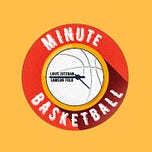












Share this post